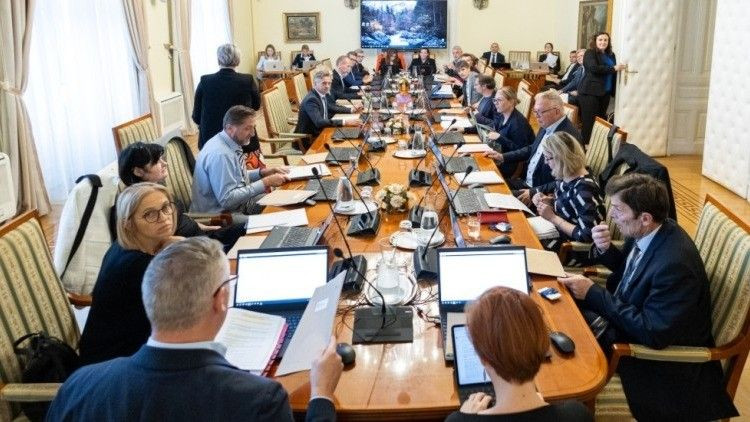165th regular session of the Government of the Republic of Slovenia
The Government adopted the Implementation Plan for the financial instrument under the financial engineering measure to support investments in the economy, and the Implementation Plan for the financial instrument under the financial engineering measure to finance liquidity and countercyclical operations. To close the significant innovation gap with the US and China, substantial increases in investment are needed in research, development and innovation, particularly in advanced technologies. Strong public incentives are therefore required to encourage more companies to invest in research, development, and innovation, as well as to foster high-quality investments that support further growth, development, and business restructuring. These efforts must align with international green and digital guidelines, the introduction of high-tech solutions, robotisation, and the modernisation of operations. To this end, SID Bank, in cooperation with the State, will establish a financial engineering mechanism designed to create an optimal environment for companies to plan their investments in the medium and long term, thereby encouraging them to make investment decisions. The financial engineering measure will provide companies with access to favourable long-term financial resources that will not place an excessive burden on their monthly cash flow. The Implementation Plan for Financial Instruments (NIFI) establishes two major loan funds: the Financial Engineering Measure for Investment in the Economy (PS8) and the Financial Engineering Measure for Liquidity Financing and Counter-Cyclical Operations (PS9).
At today's session, the Government adopted the Decree on the National Spatial Plan (NSP) for the connecting road – Maribor Western Bypass. The project aims to ease congestion in the centre of Maribor, improve traffic flow and road safety, and enhance residents' quality of life. It will also improve transport accessibility across the wider region. The NSP defines the area of the planned transport development and sets out the requirements for the construction, integration with existing transport and public utility infrastructure, measures for the protection of the environment, nature and cultural heritage, as well as other conditions to ensure coordinated and sustainable spatial development. The graphic section of the NSP is available in the Spatial Information System under the identification number 940. The Decree and its annexes are also available for inspection at the Ministry of Natural Resources and Spatial Planning, as well as at the municipalities of Hoče-Slivnica and Maribor. The adoption of the Decree is an important step in implementing one of the key infrastructure projects, which will contribute to the long-term development of the city of Maribor and the entire Podravje region.
The Slovenian Government will allocate a total contribution of EUR 5,000,000 to the International Committee of the Red Cross (ICRC) over the 2026-2030 period (at an annual rate of EUR 1,000,000). The Government also took note of the information on the intention to sign a Memorandum of Understanding between the International Committee of the Red Cross (ICRC) and the Government of the Republic of Slovenia to provide humanitarian aid totalling EUR 5,000,000 for the 2026–2030 period. The Memorandum recognises the ICRC as a key partner in implementing Slovenia's humanitarian aid. It will enable closer, more strategic cooperation, as well as more effective planning and coordination when identifying priority areas for humanitarian aid. It will also provide opportunities for more regular and in-depth access to the ICRC’s expertise and analyses, enhancing Slovenia's visibility and reputation in international humanitarian efforts. The contributions will be used to alleviate humanitarian crises, primarily in the same geographical areas as before – the European neighbourhood (Ukraine, Palestine, Syria, Yemen, Afghanistan) and sub-Saharan Africa (Sudan, the Democratic Republic of the Congo, the Horn of Africa) – or, exceptionally, in other areas in the event of new crises or a severe deterioration of existing ones. The cooperation agreement is expected to be signed on the margins of the Bled Strategic Forum, which is scheduled for 1–2 September 2025. It will be signed by the ICRC President Mirjana Spoljaric Egger and either the Minister of Foreign and European Affairs or the State Secretary of the Ministry of Foreign and European Affairs, to be determined at a later stage depending on official commitments.
The Government adopted the initiative to conclude the Agreement on Development Cooperation between the Government of the Republic of Slovenia and the Government of Ukraine and submitted it to the National Assembly's Committee on Foreign Policy for approval. Until now, the two countries have not had a formal legal framework defining the area of development cooperation, which was relatively limited until 2022. Since Russia's invasion of Ukraine in February 2022, Slovenia has continuously provided development assistance, particularly in the form of humanitarian aid. Through the Agreement on Cooperation in the Field of Security and Long-Term Support between Slovenia and Ukraine, Slovenia has pledged to continue and strengthen its humanitarian aid, development cooperation, and reconstruction efforts. The Agreement on Development Cooperation will allow for more effective and long-term planning of international development partnerships and humanitarian aid with Ukraine, while also easing the conditions for Slovenian providers to implement development and humanitarian activities in Ukraine. Slovenia will continue to pursue humanitarian and development activities, including demining, providing psychosocial assistance and medical rehabilitation, supporting the population, organising children's holidays, reconstructing destroyed infrastructure, as well as restoring and establishing social and health institutions and providing energy supply. An important segment also includes support through training in public administration and cooperation with local communities, particularly in the areas of public finance and decentralisation, democracy-building and respect for human rights, promotion of economic growth and the green transition, as well as cooperation in education, science, and innovation.


